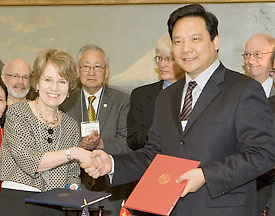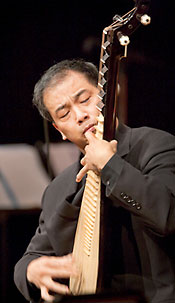Virtuoso pipa artist Yang Wei helped celebrate Thursday’s opening of the Confucius Institute at U-M (CI-UM) by performing the national anthems of the United States and the People’s Republic of China.

Speaking before Chinese dignitaries and university officials who joined the celebration at the U-M Museum of Art, President Mary Sue Coleman noted CI-UM’s unique role as a national resource on Chinese arts and culture for all Confucius Institutes in the United States.
“Arts and cultures — they are at the heart of the Confucius Institute at the University of Michigan,” Coleman said. “We will broaden the opportunities for students and faculty who are exploring Chinese culture and arts, as well as members of the community who will enjoy performances and exhibitions in the upcoming months and years.”
CI-UM joins the network of more than 60 Confucius Institutes at universities around the United States — and more than 300 worldwide. The network has developed in collaboration with the Chinese Language Council International (Hanban) in Beijing, a branch of the Chinese Ministry of Education.

“The founding of the Confucius Institute will help us understand each other better,” said Chen Yulu, vice president for international affairs at Renmin University. “This will allow both of us to further promote cooperation and friendship.” Chen joined Coleman in a signing ceremony establishing the partnership between U-M and Renmin University.
Guests arriving for the celebration were greeted by a traditional performance of the Lion Dance on the plaza outside the Maxine and Stuart Frankel and the Frankel Family Wing. The costumed dance, staged to bring joy, good luck and unity and chase away bad luck and bad spirits, was accompanied by drum and cymbals. It was presented by players from the Chung School of Praying Mantis Kung Fu of Midland, Mich. Inside the UMMA, guests were treated to traditional Chinese string, percussion and wind performances by the Chinese Ensemble of Renmin University of China.
“This occasion is the culmination of two years of work to establish a Confucius Institute on the campus of the University of Michigan,” said Lester Monts, senior vice provost of academic affairs.
CI-UM will add a substantial arts component to Coleman’s China Initiative, while advancing the university’s global programs and initiatives overall.
“As scholars, we, the U-M faculty, know the ever increasing importance of contemporary China in the 21st century world of globalized arts, economy and politics,” said Joseph Lam, professor of musicology in the School of Music, Theatre & Dance, and founding director of the CI-UM. “As teachers, we realize the effectiveness and the necessity of understanding China through its arts.”
CI-UM will host a number of faculty associates and stage a broad range of activities, such as residencies for Chinese scholars, artists, musicians, cultural exhibitions and performance groups, and substantially increased study-abroad opportunities for U-M students. Forward-looking plans include creation of the Chinese Opera and Theatre Workshop.
Development of CI-UM fulfills key elements of Coleman’s China Task Force, which recommended greater attention to the arts and humanities as opportunities for increased collaboration with China.
CI-UM is at 715 N. University, Suite 201.

